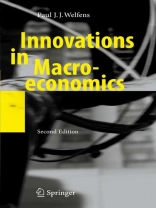Modern macroeconomics suffers from an unclear link between short-term Keynesian analysis and long-term growth modelling. Moreover, product and process innovations have been only partially integrated. The analysis suggests new approaches to innovations in open economies in many ways, including the Schumpeterian Mundell-Fleming model and new monetary growth models. A specific focus is on the role of innovations for output, employment and exchange rate developments. A new link between monetary analysis and growth modelling in open economies is presented. Structural change, innovations and growth are considered from a new perspective. Energy innovation dynamics are also considered. With respect to economic policy – in particular innovation policy – the analysis implies major changes, concerning both EU countries and other leading OECD economies.
Tabela de Conteúdo
Globalization, Specialization and Innovation Dynamics.- Savings, Investment and Growth: New Approaches for Macroeconomic Modelling.- Economic Integration, Technological Progress and Growth.- Impact of the Real Exchange Rate on Trade, Structural Change and Growth.- Macroeconomic Aspects of Opening Up, Unemployment, Growth and Transition.- Productivity Shocks, Innovations, Stock Market Dynamics and Growth.- Innovation Dynamics and Optimum Growth.- Trade, Structural Change and Growth in an Open Monetary Economy.- Innovations in the Digital Economy: Promotion of R&D and Growth in Open Economies.- EU Innovation Policy: Analysis and Critique.- Financial Market Integration, Interest Rates and Economic Development.- Natural Resources, Oil Prices and Innovation Dynamics.












